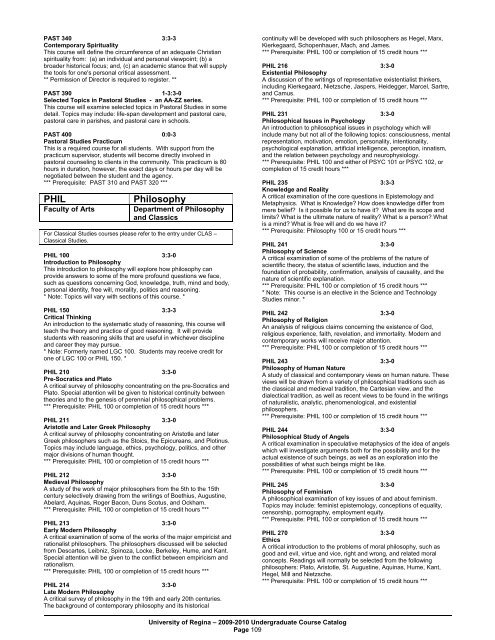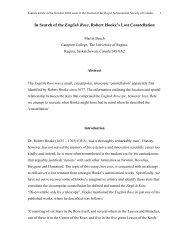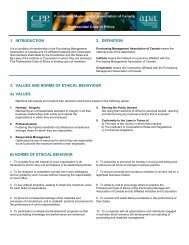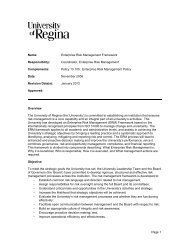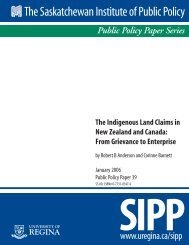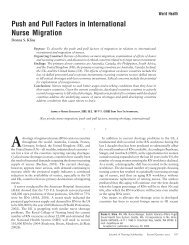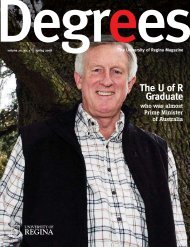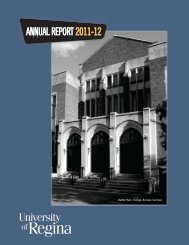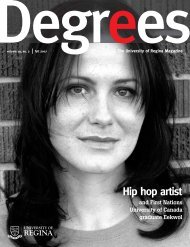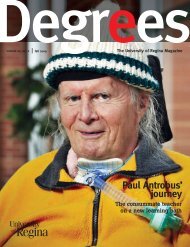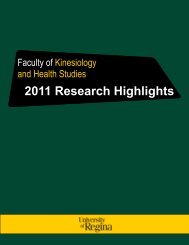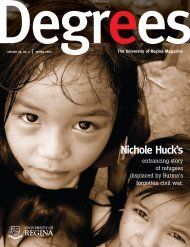2009-2010 Undergraduate Course Catalog - University of Regina
2009-2010 Undergraduate Course Catalog - University of Regina
2009-2010 Undergraduate Course Catalog - University of Regina
You also want an ePaper? Increase the reach of your titles
YUMPU automatically turns print PDFs into web optimized ePapers that Google loves.
PAST 340 3:3-3<br />
Contemporary Spirituality<br />
This course will define the circumference <strong>of</strong> an adequate Christian<br />
spirituality from: (a) an individual and personal viewpoint; (b) a<br />
broader historical focus; and, (c) an academic stance that will supply<br />
the tools for one's personal critical assessment.<br />
** Permission <strong>of</strong> Director is required to register. **<br />
PAST 390 1-3:3-0<br />
Selected Topics in Pastoral Studies - an AA-ZZ series.<br />
This course will examine selected topics in Pastoral Studies in some<br />
detail. Topics may include: life-span development and pastoral care,<br />
pastoral care in parishes, and pastoral care in schools.<br />
PAST 400 0:0-3<br />
Pastoral Studies Practicum<br />
This is a required course for all students. With support from the<br />
practicum supervisor, students will become directly involved in<br />
pastoral counseling to clients in the community. This practicum is 80<br />
hours in duration, however, the exact days or hours per day will be<br />
negotiated between the student and the agency.<br />
*** Prerequisite: PAST 310 and PAST 320 ***<br />
PHIL<br />
Faculty <strong>of</strong> Arts<br />
Philosophy<br />
Department <strong>of</strong> Philosophy<br />
and Classics<br />
For Classical Studies courses please refer to the entry under CLAS –<br />
Classical Studies.<br />
PHIL 100 3:3-0<br />
Introduction to Philosophy<br />
This introduction to philosophy will explore how philosophy can<br />
provide answers to some <strong>of</strong> the more pr<strong>of</strong>ound questions we face,<br />
such as questions concerning God, knowledge, truth, mind and body,<br />
personal identity, free will, morality, politics and reasoning.<br />
* Note: Topics will vary with sections <strong>of</strong> this course. *<br />
PHIL 150 3:3-3<br />
Critical Thinking<br />
An introduction to the systematic study <strong>of</strong> reasoning, this course will<br />
teach the theory and practice <strong>of</strong> good reasoning. It will provide<br />
students with reasoning skills that are useful in whichever discipline<br />
and career they may pursue.<br />
* Note: Formerly named LGC 100. Students may receive credit for<br />
one <strong>of</strong> LGC 100 or PHIL 150. *<br />
PHIL 210 3:3-0<br />
Pre-Socratics and Plato<br />
A critical survey <strong>of</strong> philosophy concentrating on the pre-Socratics and<br />
Plato. Special attention will be given to historical continuity between<br />
theories and to the genesis <strong>of</strong> perennial philosophical problems.<br />
*** Prerequisite: PHIL 100 or completion <strong>of</strong> 15 credit hours ***<br />
PHIL 211 3:3-0<br />
Aristotle and Later Greek Philosophy<br />
A critical survey <strong>of</strong> philosophy concentrating on Aristotle and later<br />
Greek philosophers such as the Stoics, the Epicureans, and Plotinus.<br />
Topics may include language, ethics, psychology, politics, and other<br />
major divisions <strong>of</strong> human thought.<br />
*** Prerequisite: PHIL 100 or completion <strong>of</strong> 15 credit hours ***<br />
PHIL 212 3:3-0<br />
Medieval Philosophy<br />
A study <strong>of</strong> the work <strong>of</strong> major philosophers from the 5th to the 15th<br />
century selectively drawing from the writings <strong>of</strong> Boethius, Augustine,<br />
Abelard, Aquinas, Roger Bacon, Duns Scotus, and Ockham.<br />
*** Prerequisite: PHIL 100 or completion <strong>of</strong> 15 credit hours ***<br />
PHIL 213 3:3-0<br />
Early Modern Philosophy<br />
A critical examination <strong>of</strong> some <strong>of</strong> the works <strong>of</strong> the major empiricist and<br />
rationalist philosophers. The philosophers discussed will be selected<br />
from Descartes, Leibniz, Spinoza, Locke, Berkeley, Hume, and Kant.<br />
Special attention will be given to the conflict between empiricism and<br />
rationalism.<br />
*** Prerequisite: PHIL 100 or completion <strong>of</strong> 15 credit hours ***<br />
PHIL 214 3:3-0<br />
Late Modern Philosophy<br />
A critical survey <strong>of</strong> philosophy in the 19th and early 20th centuries.<br />
The background <strong>of</strong> contemporary philosophy and its historical<br />
continuity will be developed with such philosophers as Hegel, Marx,<br />
Kierkegaard, Schopenhauer, Mach, and James.<br />
*** Prerequisite: PHIL 100 or completion <strong>of</strong> 15 credit hours ***<br />
PHIL 216 3:3-0<br />
Existential Philosophy<br />
A discussion <strong>of</strong> the writings <strong>of</strong> representative existentialist thinkers,<br />
including Kierkegaard, Nietzsche, Jaspers, Heidegger, Marcel, Sartre,<br />
and Camus.<br />
*** Prerequisite: PHIL 100 or completion <strong>of</strong> 15 credit hours ***<br />
PHIL 231 3:3-0<br />
Philosophical Issues in Psychology<br />
An introduction to philosophical issues in psychology which will<br />
include many but not all <strong>of</strong> the following topics: consciousness, mental<br />
representation, motivation, emotion, personality, intentionality,<br />
psychological explanation, artificial intelligence, perception, innatism,<br />
and the relation between psychology and neurophysiology.<br />
*** Prerequisite: PHIL 100 and either <strong>of</strong> PSYC 101 or PSYC 102, or<br />
completion <strong>of</strong> 15 credit hours ***<br />
PHIL 235 3:3-3<br />
Knowledge and Reality<br />
A critical examination <strong>of</strong> the core questions in Epistemology and<br />
Metaphysics. What is Knowledge How does knowledge differ from<br />
mere belief Is it possible for us to have it What are its scope and<br />
limits What is the ultimate nature <strong>of</strong> reality What is a person What<br />
is a mind What is free will and do we have it<br />
*** Prerequisite: Philosophy 100 or 15 credit hours ***<br />
PHIL 241 3:3-0<br />
Philosophy <strong>of</strong> Science<br />
A critical examination <strong>of</strong> some <strong>of</strong> the problems <strong>of</strong> the nature <strong>of</strong><br />
scientific theory, the status <strong>of</strong> scientific laws, induction and the<br />
foundation <strong>of</strong> probability, confirmation, analysis <strong>of</strong> causality, and the<br />
nature <strong>of</strong> scientific explanation.<br />
*** Prerequisite: PHIL 100 or completion <strong>of</strong> 15 credit hours ***<br />
* Note: This course is an elective in the Science and Technology<br />
Studies minor. *<br />
PHIL 242 3:3-0<br />
Philosophy <strong>of</strong> Religion<br />
An analysis <strong>of</strong> religious claims concerning the existence <strong>of</strong> God,<br />
religious experience, faith, revelation, and immortality. Modern and<br />
contemporary works will receive major attention.<br />
*** Prerequisite: PHIL 100 or completion <strong>of</strong> 15 credit hours ***<br />
PHIL 243 3:3-0<br />
Philosophy <strong>of</strong> Human Nature<br />
A study <strong>of</strong> classical and contemporary views on human nature. These<br />
views will be drawn from a variety <strong>of</strong> philosophical traditions such as<br />
the classical and medieval tradition, the Cartesian view, and the<br />
dialectical tradition, as well as recent views to be found in the writings<br />
<strong>of</strong> naturalistic, analytic, phenomenological, and existential<br />
philosophers.<br />
*** Prerequisite: PHIL 100 or completion <strong>of</strong> 15 credit hours ***<br />
PHIL 244 3:3-0<br />
Philosophical Study <strong>of</strong> Angels<br />
A critical examination in speculative metaphysics <strong>of</strong> the idea <strong>of</strong> angels<br />
which will investigate arguments both for the possibility and for the<br />
actual existence <strong>of</strong> such beings, as well as an exploration into the<br />
possibilities <strong>of</strong> what such beings might be like.<br />
*** Prerequisite: PHIL 100 or completion <strong>of</strong> 15 credit hours ***<br />
PHIL 245 3:3-0<br />
Philosophy <strong>of</strong> Feminism<br />
A philosophical examination <strong>of</strong> key issues <strong>of</strong> and about feminism.<br />
Topics may include: feminist epistemology, conceptions <strong>of</strong> equality,<br />
censorship, pornography, employment equity.<br />
*** Prerequisite: PHIL 100 or completion <strong>of</strong> 15 credit hours ***<br />
PHIL 270 3:3-0<br />
Ethics<br />
A critical introduction to the problems <strong>of</strong> moral philosophy, such as<br />
good and evil, virtue and vice, right and wrong, and related moral<br />
concepts. Readings will normally be selected from the following<br />
philosophers: Plato, Aristotle, St. Augustine, Aquinas, Hume, Kant,<br />
Hegel, Mill and Nietzsche.<br />
*** Prerequisite: PHIL 100 or completion <strong>of</strong> 15 credit hours ***<br />
<strong>University</strong> <strong>of</strong> <strong>Regina</strong> – <strong>2009</strong>-<strong>2010</strong> <strong>Undergraduate</strong> <strong>Course</strong> <strong>Catalog</strong><br />
Page 109


